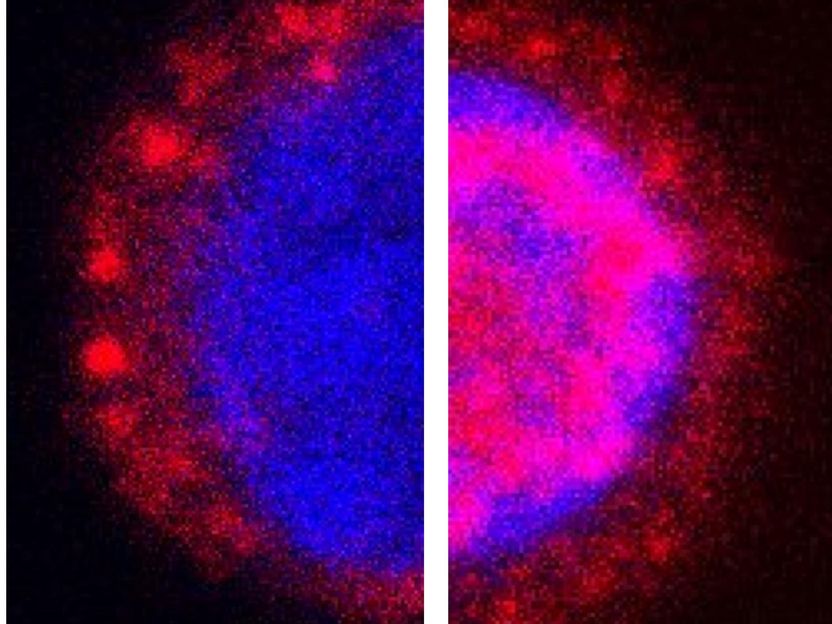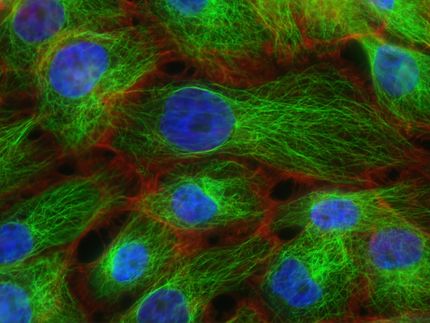Weapon against Tumours, Boost for the Immune System
Activating X-rays – Signalling Cascade in T-cells
radiation therapy is a proven approach to destroying tumours. However, it is possible that it might be able to do even more in the future – namely stimulate the immune system at the same time and so fight cancer even more intensively. The foundations for this have been laid by researchers led by TU Darmstadt. They have found that X-rays trigger a calcium signalling cascade in cells of the immune system.

T-lymphocytes before (left) and after (right) the treatment with X-rays. Before radiation, the transcription factor NFAT (nuclear factor of activated T-cells) is mainly located in the cytosol (red fluorescence). After radiation, NFAT migrates into the cell nucleus (blue fluorescence) where it activates important genes for immune activation in the lymphocytes.
Gerhard Thiel
Ionising radiation is successfully used in cancer treatment to kill tumour cells. Over the past two decades, it has become clear that treatment success can be increased even further if the radiation treatment is combined with measures to stimulate the immune system. In this context, a new study being carried out with biologists from TU Darmstadt and the GSI Helmholtz Centre for Heavy Ion Research plus researchers from the clinics of the Frankfurt and Homburg universities is attracting attention. The researchers report in the Journal of General Physiology that the desired stimulating effect on the immune system is triggered directly when T-cells are also irradiated by x-rays. Dominique Tandl, researcher at the Department of Biology at TU Darmstadt, and her co-authors demonstrate in the recently published study that clinically relevant doses of x-rays in T lymphocytes trigger a signalling cascade that is typical of the immune reaction that begins with the release of the messenger substance calcium (Ca2+) from internal stores.
Activated by what is known as store operated Ca2+ entry (SOCE), the concentration of Ca2+ in the cells begins to oscillate at a critical frequency, which in turn leads to the displacement (translocation) of a transcription factor from the cytoplasm into the cell nucleus. Once there, this transcription factor initiates gene expression, and the cell begins to make molecules that are important for the immune response, such as cytokines. Since the irradiation of tumours invariably always affects the blood cells in the target tissue, medicine could utilise the stimulating effect of x-rays on T lymphocytes. The researchers hope that their studies will contribute to improving cancer treatment in the long term, as Professor Gerhard Thiel, head of the Membrane Biophysics Group at the Department of Biology at TU Darmstadt and co-author of the study, says. "It could be possible to enhance the killing effect of ionising radiation on tumour cells and at the same time to stimulate the immune system with the help of this radiation."
Original publication
Other news from the department science

Get the life science industry in your inbox
By submitting this form you agree that LUMITOS AG will send you the newsletter(s) selected above by email. Your data will not be passed on to third parties. Your data will be stored and processed in accordance with our data protection regulations. LUMITOS may contact you by email for the purpose of advertising or market and opinion surveys. You can revoke your consent at any time without giving reasons to LUMITOS AG, Ernst-Augustin-Str. 2, 12489 Berlin, Germany or by e-mail at revoke@lumitos.com with effect for the future. In addition, each email contains a link to unsubscribe from the corresponding newsletter.





















































